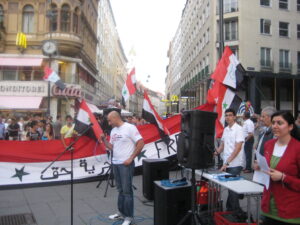
The Syrian people has been struggling for democracy for months now. As the Assad regime reveals its incapacity to reform day by day, answering the legitimate popular demands only with brute violence, the movement more and more turns into a revolution for which a death toll will be paid.
Revolt against neo-liberalism
In Europe (and also among the Syrians in exile) there is talk only about democracy – but this is dangerous, for in the last decades democracy has become a neo-colonial export product (see Iraq and Afghanistan). Without further specification democracy simply means the more or less mediated rule of the western oligarchy excluding the poorer classes, both politically and socially.
In Syria as in the Arab world in general we see a popular movement against the capitalist elites who are linked with and are benefiting from the dictatorship. Often these ties are secured by family or clan relations as exemplified by the billionaire cousin of Assad, Rami Makhlouf. This social aspect, which is highlighted by the revolutionary forces on the ground, is decisive. Democracy for the popular masses is only possible in combination with social justice and socio-economic independence from the west.
Against the regional order
In contrast to most of the pro-western Arab dictatorships the regime of Assad has been drawing legitimacy from what they claim to be opposition or even resistance to the US and Israeli order. Actually Damascus has been supporting the Lebanese Hezbollah, which resisted the Israeli onslaught, has been offering a save haven to Palestinian resistance groups and is part of an axis with Tehran, challenging US supremacy.
This support is, however, relative and instrumental. When in the 1970s the Lebanese revolution hand in hand with the Palestinian resistance were on the advance, Assad intervened militarily and hit them hard. Later Syrian control over Lebanon was bought by the support for the US aggression on Iraq in 1991. Though there is no peace treaty with Israel, as the Zionists refuse to return the Golan, there is no active resistance against Israel either. In order to survive, Assad is defending the regional status quo, which the democratic mass movement is fighting against in the entire region.
A victory of the Syrian revolt would mean another serious blow against the US order in the region and would propel the popular movements further ahead. The results are, however, open. If the revolutionary forces are not cautious, imperialism is ready to use the upheavals to redraw its own order (see Libya).
Secularism versus sectarianism
Assad likes to pose as the guarantor of a secular state. In fact the contrary is true. The combination of political, military and economic power with the Alawite confessional community is fuelling sectarian strife.
As its homologues in Egypt and Tunisia (and actually also like in the west) the Assad regime is demonizing Sunni Islamism. But not only did the current democratic movements force the Islamists to follow them and weakened the Islamic cultural agenda in general. Also historically Sunni Islamism is weak in Syria, because of the failed voluntarist uprising of 1982 and also because of the multi-religious composition of the country. Today the anti-democratic Salafi groups are an insignificant minority.
The democratic movements indicate that the Islamist cycle is drawing to a close. The masses do not need Islamism any more to raise their voice against western dominance. Although they continue to defend their Islamic identity, they first of all demand and fight for democracy. In this respect Syria is not different from the entire region. On the other hand Washington eventually understood that they need to co-operate with and adopt at least a section of the Muslim Brotherhood in order to curb the revolutionary drive of the masses. Thus we see another example how rapidly “bad” can turn into “good” and vice versa if realpolitik happens to need that.
Besides the regime itself, the ones pushing the sectarian conflict between the confessional communities are the pro-western forces and especially the Saudi allies (who are not very much interested in democracy). The only force able to guarantee the unity of the confessions is the democratic movement itself. All its components ranging from the left, the nationalists even to the Islamic forces, continuously stressed the multi-confessional and even secular goals, consciously acting against sectarianism.
Against military intervention and sanctions
Real revolutions never come for free, they demand sacrifices. These cannot be minimised by western meddling – on the contrary. The worst thing that could happen to the Syrian movement is a western or Turkish (with western backing) military intervention robbing the fruits of the revolution in order to turn it into neo-colonialism under democratic guise. The Libyan tragedy must not be repeated. There the western corporations already got their knifes out. For them democracy means the right to exploit. (Actually it seems as if the NATO bombs will bring to power oil Islamists of the Gulf type.)
The demand for sanctions is wrong, if it is addressing the western powers, asking them to intervene. They in turn are keen to get a carte-blanche from the democratic movement for intervention. What will be the logic consequence and escalation of sanctions if the west doesn’t get what they want? Military means.
A real revolution is only worth its name, if it is advancing freedom and social justice for the vast majority of the people and especially the poorest and most down-trodden. It is a democratic revolution if the newly established power represents the lower classes. It is not worth its name when its calls for the help of the former colonial powers, who in the last instance are responsible for the misery. The revolution must establish more independence from the west (political, military, economic, cultural one) not less than Assad. Otherwise it becomes a counterrevolution in the name of democracy.
Down with the US-Israeli order!
Democracy is people’s power or it is not democracy!